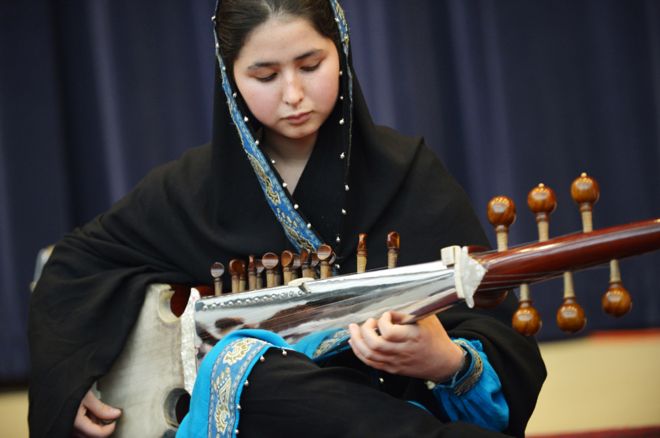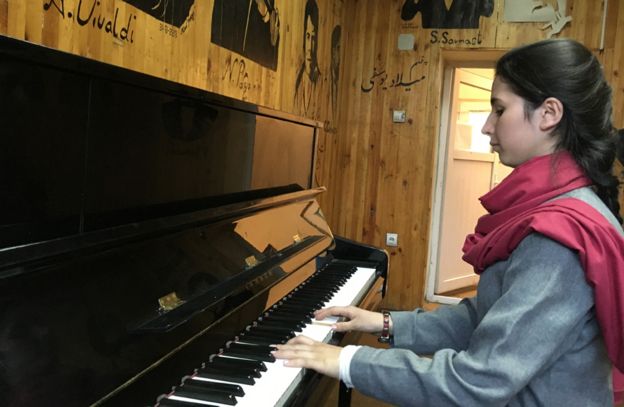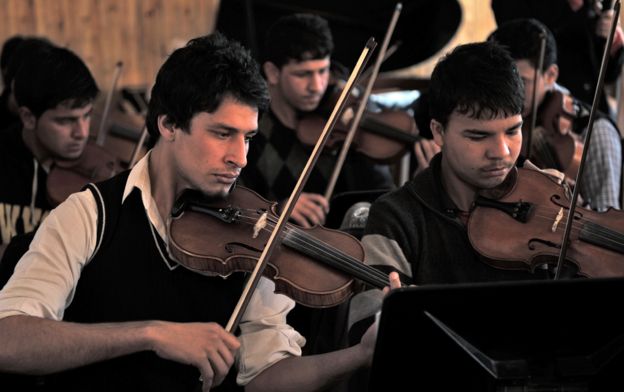Afghanistan's first female conductor
By Shaimaa Khalil
BBC News, Kabul
10 November 2015
From the sectionMagazine

Image copyright
Getty Images
In today's Magazine
For many years, the Taliban banned music and the education of girls in Afghanistan - and although many women still find themselves restricted, one 17-year-old has become the country's first female conductor.Kabul is a noisy place with helicopters, sirens, and heavy traffic. But walking into a building in one of the city's quieter neighbourhoods, I'm welcomed by quite a different sound.Boys and girls are playing the piano, cello and flute as well as traditional Afghan stringed instruments such as the rubab and sarod. This is the Afghanistan National Institute of Music - the only school of its kind in the country.The female students have just finished their first concert. Their male colleagues were watching and are now milling around, playing and chatting before heading home at the end of a big day.What was so special about this concert - apart from the fact that it was an all-female ensemble playing music to a big audience in the middle of violence-ridden Kabul - was that it was led by the country's very first female conductor, 17-year-old Negin Khpolwak who is also a student here.

Now, she has retreated along a concrete corridor to one of the rehearsal rooms where she's sitting at the piano playing one of her favourite pieces - a piano sonatina in C major by the Italian composer Muzio Clementi.
Find out more
Listen to From Our Own Correspondent for insight and analysis from BBC journalists, correspondents and writers from around the worldBroadcast on Radio 4 on Thursdays at 11:00 and Saturdays at 11:30 and on BBC World ServiceListen to the programmeDownload the programme
I can see she's still learning it but what she lacks in experience, she makes up for with her spirit and passion."Khosh Amadeed - welcome," says Negin with a shy smile. "Today my hands are aching a bit so I am not on a top form. But I love practising the piano."All I want is to become a very good concert pianist and conductor, not only in Afghanistan, but in the world," she says."So did you grow up around music?" I ask. "No," she says looking startled.She comes from a poor family in Kunar province, a conservative area - one of the strongholds of the Taliban insurgency in the north-east of Afghanistan."Girls in Kunar don't go to school and many are not allowed to study music by their families," she says. "So I had to go to Kabul to fulfil my dream. My father helped me."
The Afghanistan National Institute of Music

Image copyright
Getty Images
- Set up in 2010 with help from the World Bank
- Its teachers come from many countries including Afghanistan, the US, Australia, Russia, Colombia and India
- It has a special focus on supporting the most disadvantaged members of Afghan society, particularly orphans and street vendors
When Negin was nine, he sent her to live in a children's home in Kabul so that she could get an education.That's where she first started listening to music and watching performances on television.She auditioned to join the institute and has been studying here for four years - of more than 200 students, about a quarter are girls.It wasn't all plain sailing though. Negin's mother was happy for her to go to school, but didn't like the idea of her studying music. She wasn't the only one who felt this way."My uncle told us, 'No girls in our family should learn music. It's against tradition.'"Under pressure from her relatives, Negin had to leave the institute for six months. Eventually her father intervened, telling her uncle, "It's Negin's life. She should study music if she wants to.""So I came back," she says.